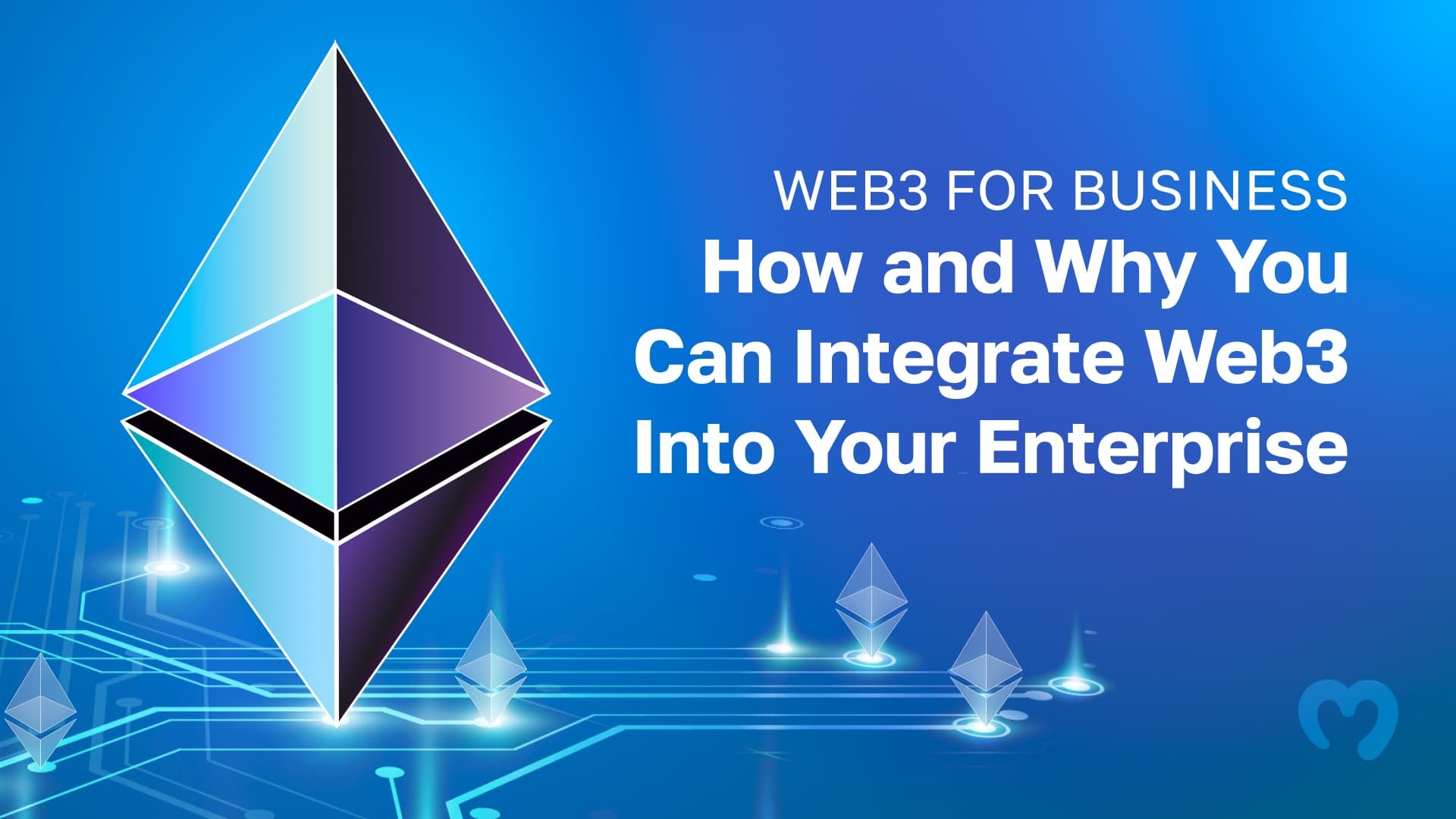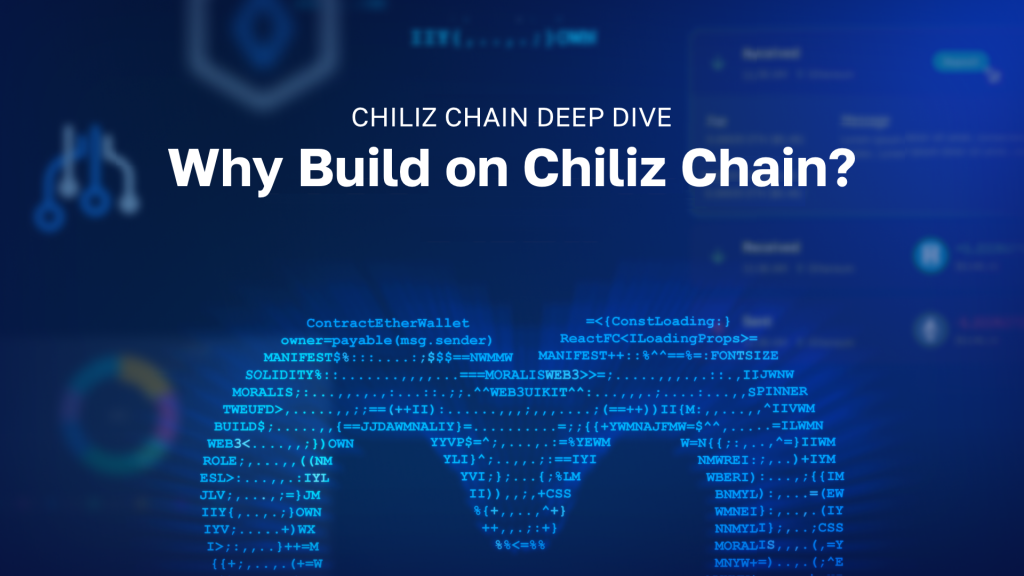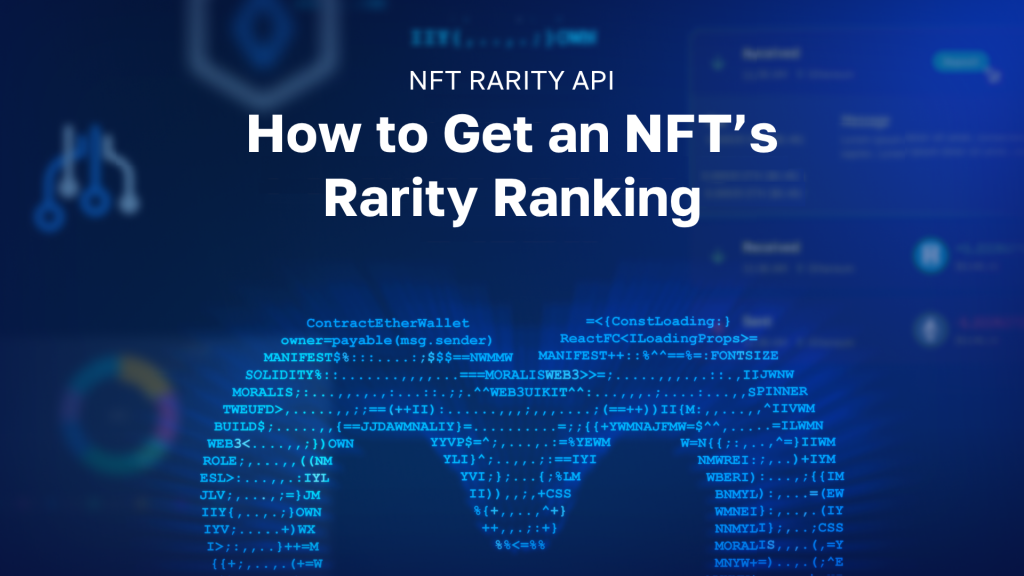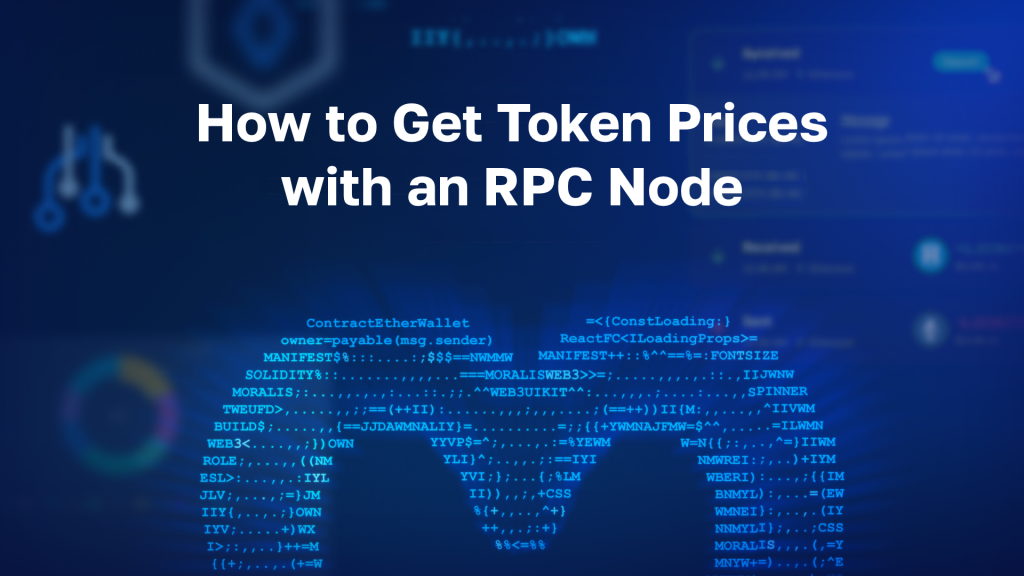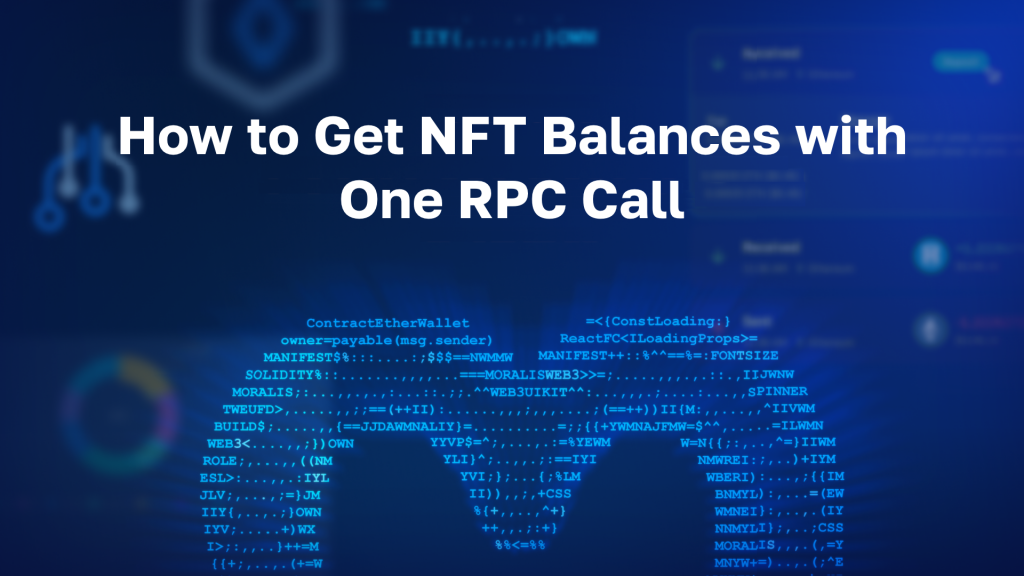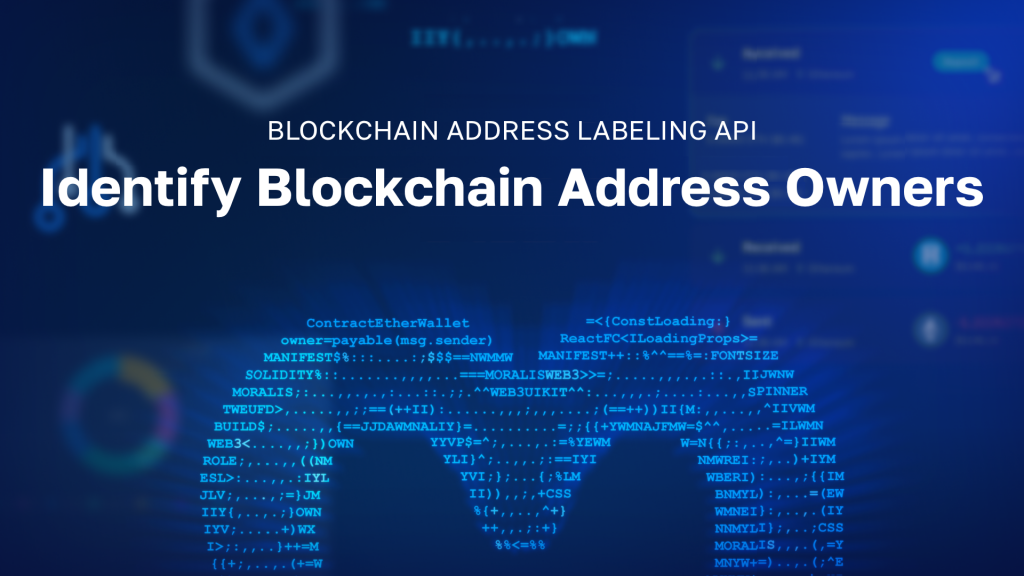When exploring the intricacies of Web3 for business, you’ll quickly notice that the underlying technology has the potential to disrupt conventional industries, highlighting the need for seamless Web3 integration. As such, in combination with diving deeper into Web3 for business, this article explores the easiest way to integrate Web3 into any tech stack – by using Moralis!
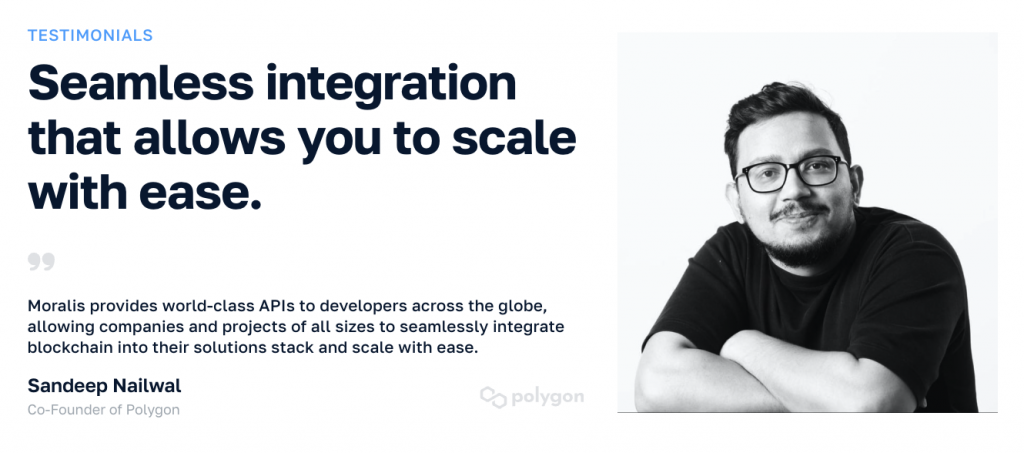
Moralis’ enterprise-grade Web3 APIs enable a more seamless developer experience, allowing anyone to easily leverage blockchain technology to build faster and smarter. In fact, Moralis presents the quickest way to build a Web3 app! In addition to excellent development tools, Moralis also features cross-chain compatibility, which adds to your project’s scalable Web3 infrastructure. Plus, Moralis offers integrations with services such as IPFS, letting you upload files to IPFS quickly and easily!
Nevertheless, if you want to integrate Web3 for business, consider signing up with Moralis. Creating an account is completely free, and you will receive immediate access to excellent development tools such as the Web3 APIs!
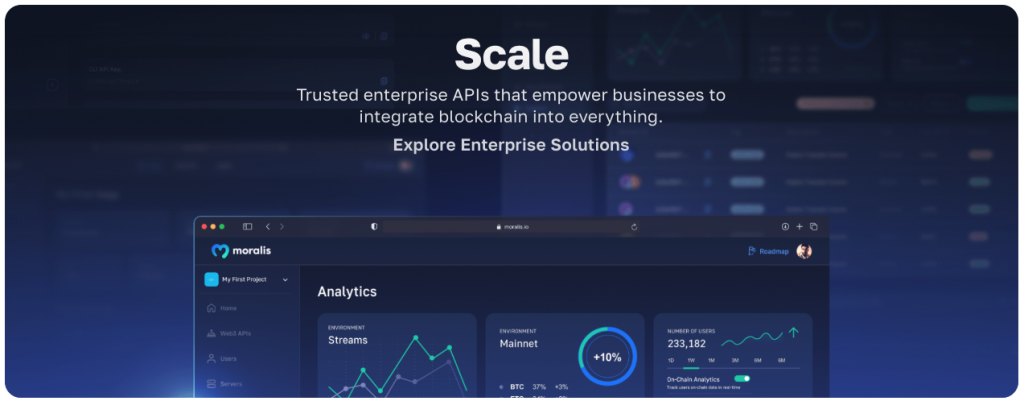
Overview
As Web3 presents excellent opportunities for innovation, it is no surprise that businesses actively experiment within this rapidly emerging space. Although conventional media primarily emphasizes NFTs, cryptocurrencies, and blockchains, enterprises focus on Web3’s business use cases. Moreover, serious organizations recognize the potential of blockchain and are actively exploring innovative ways to leverage this technology. As such, it becomes intriguing to understand the impact Web3 has on today’s business landscape, which is why this article explores the intricacies of Web3 for business!
Before we get into the details of Web3 for business and how the decentralized web affects the business world, we need to return to basics. As such, the initial section answers the question, ”what is Web3?”.
What is Web3?
Even if you are new to the blockchain development space, odds are you’ve heard of Web3. Furthermore, Web3 is, in layman’s terms, generally understood as the ”third phase of the internet”. Accordingly, as you can imagine, there are two prior generations/phases of the internet: Web1 and Web2!
- Web1 – Static
- Web2 – Dynamic and Interactive
- Web3 – Decentralized
As the above-mentioned bullet points illustrate, each phase is defined by pervading characteristics. Web1 was static, meaning that, during the early days of the internet, users mainly consumed content and had no way of contributing.
Along with the rise of prominent social media conglomerates, the static nature of the web shifted to become more interactive and dynamic, and this phase is generally referred to as Web2. With a more dynamic web experience, users could contribute and participate in creating value.
However, Web2 is also highly centralized, inducing problems with transparency, single points of failure, privacy, etc. As a result, Web3 is currently quickly emerging to introduce the notion of decentralization. With this paradigm, the internet shifts from a centralized model to being blockchain-based. Moreover, two critical components of the Web3 ecosystem are dapps and smart contracts. These components largely contribute to how Web3 can revolutionize today’s internet by, among other things, providing a platform for innovation and the opportunity to cut out unnecessary intermediaries!
Nevertheless, with an overview of the decentralized web, it is now time to take a closer look at Web3 for business and how this phase of the internet currently impacts today’s business landscape!
Web3 for Business – How is Web3 Impacting Businesses?
With the significant impact Web2 had on the business world, it is not hard to imagine that the Web3 revolution will induce the same effects. Consequently, this presents significant opportunities for existing and new organizations to disrupt today’s business landscape. For this reason, it becomes exciting to broaden our knowledge regarding what Web3 for business entails and answer the question, ”how is Web3 impacting businesses?”.
The capabilities of Web3’s underlying blockchain technology enable businesses to improve existing and develop new innovative business models in all sectors of the economy, ranging from financial service companies to the healthcare industry. Moreover, these opportunities mainly originate from Web3’s decentralized architecture.
As a result, businesses are experimenting with notions such as revenue sharing, income sharing, continuous funding, ICOs, etc. However, covering all potential ways in which Web3 impacts the business world falls beyond the scope of this article, which is why the article narrows it down to elaborate on the following three areas briefly:
- DAOs – DAOs generally refer to the governance body of Web3 projects/protocols. When DAOs are established, tokens are distributed, allowing stakeholders to participate in critical decision-making. Hence, this presents an innovative opportunity for organizations to structure their governing body in a decentralized manner.
- Less Onboarding Friction – Unlike today’s web ecosystem, the decentralized web features a unified identification layer. Accordingly, users only need their Web3 identity to log in with various platforms, contributing to a more seamless user experience. What’s more, it lowers onboarding friction, highly benefiting businesses.
- Distributed Ledgers and Supply Chains – Blockchains are distributed ledgers, and businesses have been experimenting with this technology to track data, store data, detect counterfeits, etc., within their supply chains.
Nevertheless, the impact Web3 has on business will only continue to grow, highlighting the need for easy Web3 for business integrations!
Real-Life Web3 for Business Examples
Before we look into the easiest way to integrate Web3 for business, this section will cover three real-life examples of organizations that have successfully integrated Web3. More specifically, we will look closely at Uniswap, Filecoin, and Livepeer!
- Uniswap – Uniswap is one of the most prominent DEXs or “decentralized exchanges” currently available on the market. Moreover, it is an AMM (automated market maker), meaning that Uniswap uses decentralized liquidity pools that function through smart contracts.
- Filecoin – Filecoin is a distributed file storage network, which is ideal for storing large data sets. The network supplies better interoperability and higher performance for a better price than conventional cloud storage services.
- Livepeer – Livepeer is a video streaming platform based on the Ethereum blockchain. The network is decentralized and open-source, with the purpose of providing an infrastructure and stack for Web3 video streaming.
With a better understanding of how Web3 will impact the business world and some prominent examples of organizations leveraging Web3 technology, it is time to take a closer look at how you can integrate Web3 for business easily!
Integrating Web3 for Business
As highlighted in the ”Web3 for Business – How is Web3 Impacting Businesses?” section, it is evident that Web3 significantly impacts businesses worldwide. Furthermore, Web3’s decentralized architecture makes it possible for developers to disrupt well-established industries by providing new, innovative business models. Hence, organizations must have the opportunity to integrate Web3 for business easily.
The need for accessible Web3 integration is twofold. First, it provides startups with great opportunities to grow and claim shares in otherwise challenging markets to break into. Second, it ensures that well-establish companies can keep their position within a market and keep growing. However, it is always challenging to adopt new technologies without easy integration, especially for larger companies that are less flexible.
Moreover, from a conventional perspective, it has been quite a challenge to adopt and integrate Web3 for business, and the main reason has been the lack of professional development tools. However, this is where Moralis takes center stage by providing a more accessible route to Web3 integration for business!
Moralis provides scalable Web3 infrastructure for smaller and large organizations looking to integrate Web3 for business. With Moralis, you have the opportunity to unlock the power of blockchain to build dapps and other Web3 projects faster and more effectively. Moralis’ Web3 APIs bridge the development gap between Web2 and Web3 by enabling you to integrate blockchain into any tech stack. As a result, with Moralis, you can build powerful Web3 apps with the seamless developer experience of Web2!
Read on as the following section takes a deeper dive into each of Moralis’ enterprise-grade Web3 APIs!
Moralis’ Enterprise-Grade APIs – Web3 Made Accessible for Any Business
This section explores the intricacies of Moralis’ Web3 APIs, which are enterprise-grade development tools making Web3 integration accessible to anyone! If you want to integrate Web3 into any tech stack, read on and learn the easiest way to do so!
Moreover, the following sections will dive deeper into the following six APIs:
- Web3 Streams API
- Auth API
- Solana API
- EVM API
- NFT API
- Token API
Along with briefly exploring the ins and outs of Moralis’ APIs, the following section also looks at some practical examples of the APIs’ capabilities. Nevertheless, let us continue and jump straight into the first API: Moralis’ Web3 Streams API!
Streams API
Moralis’ Streams API lets you easily stream blockchain data into your backend using Web3 webhooks. Thanks to Moralis’ cross-chain capabilities, you can receive webhooks from almost any network, layer-2 solution, and their respective testnets!
With the Streams API, you can receive Web3 webhooks whenever:
- A particular crypto address trades by sending/receiving assets
- Specific tokens are exchanged
- Participation activity in your token sale
- Smart contract events are triggered based on your filters
- And much more
Auth API
Next up, you have Moralis’ Auth API providing a unified Web3 and Web2 authentication flow for all your applications. What’s more, it is compatible with any tech stack, and you will be in complete control of all user data.
The API supplies a unified tool for setting up any Web3 authentication methods, along with a comprehensive SDK for easy integration. Moreover, the Auth API is continuously improved to keep up with the fast-moving Web3 industry. Consequently, use this API to future-proof all your authentication flows. For example, you can easily learn to add Coinbase Wallet login functionality!
Solana API
With the Solana API, you can build Solana-based projects in no time! This Moralis tool provides the ability to query token and user data, which you can use in any of your Solana projects. As such, you gain easy access to on-chain data such as balances, prices, symbols, names, and more!
EVM API
Moralis’ EVM API makes it possible to query on-chain data and send requests to any EVM-compatible blockchain. As such, when working with Moralis, you will be able to develop EVM dapps more effectively and efficiently!
For instance, you can query data such as block numbers, dates, smart contract events, and more! So, if you are considering EVM development, make sure to check out Moralis’ EVM API further!
NFT API
Moralis’ NFT API accumulates everything you need to build notable NFT dapps. This API makes it accessible to fetch real-time NFT metadata, ownership data, transfer data, prices, etc. What’s more, the NFT API features complete cross-chain support. As a result, you can easily query NFT-related data from any supported chains, including Ethereum, Polygon, Avalanche, Solana, and more!
Token API
The Token API makes integrating real-time token data into your Web3 applications easy. As such, you can get token prices, ownership, and transfer data across several of the most prominent blockchain networks!
Summary – Web3 for Business
The rise of social media and the internet’s transition to Web2 revolutionized the business world, giving rise to some of the world’s largest conglomerates. With the incredible effects Web2 had on the business world, it is not unlikely that the Web3 paradigm shift will result in similar outcomes. Consequently, it becomes intriguing to explore the ins and outs of Web3 for business!
The capabilities of Web3 and the underlying blockchain technology lays the foundation for an exciting industry that presents significant opportunities for emerging and existing organizations. As such, businesses are currently experimenting with notions such as income sharing, revenue sharing, DAOs, ICOs, etc.
However, from a conventional perspective, the entry barriers to integrating Web3 for business have been relatively high. Fortunately for you, this is no longer the case, as Moralis makes the integration of Web3 and blockchain technology significantly more accessible. The accessibility primarily originates from Moralis’ six Web3 APIs:
- Web3 Streams API
- Auth API
- Solana API
- EVM API
- NFT API
- Token API
If you found this guide helpful and want to learn more about Moralis, and the industry in general, check out additional content here at the Moralis Web3 blog. For example, check out our articles on the Sui blockchain or how to mint a coin on Solana!
So, if you want to integrate Web3 for business and explore Moralis further, sign up with Moralis right now! You can create your account for free; it only takes a couple of seconds!


